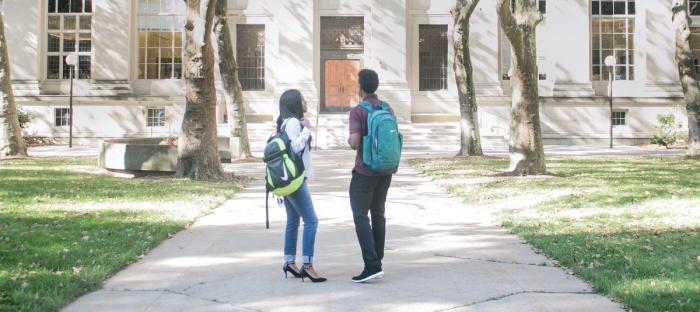Do you remember what it was like to be in the 9th grade? Can you easily recall the feelings of fear, insecurity, and dread by simply envisioning the hallways of your high school?
If you are like me, being in youth ministry has meant regularly coming face to face with your high school self. I see myself reflected in so many of my students’ struggles and insecurities and I hear my voice in their prayer requests about school and friend drama. When I hear them share their experiences as teenagers, I am easily transported to my high school days, reminding me that these emotions are indeed valid—and often painful.
Perhaps the emotion I find myself recalling most frequently is that of isolation and exclusion. Of course, such feelings are not specific to high school students, as adulthood is certainly no guarantor against the pains of loneliness. It seems, however, that isolation and exclusion run rampant throughout the teen years, driving our students to latch on to any sense of community they can find, regardless of its authenticity.
Some students feel isolated despite their apparent “popularity.” Others are more explicitly excluded because they have been deemed “uncool” as a result of their choice to not drink underage or cross certain physical boundaries with the opposite sex. Friends abandon friends. Romantic relationships are ended over Snapchat. And our students’ subsequent loneliness leads them to a profound longing for true community.
It seems others have noticed this trend as well, even on a national level: a 2018 Cigna survey reported that Generation Z, or those ages 18-22, scored an average of 48 on a 20-to-80 loneliness scale, placing them above the average scale of 39 for ages 72 and older, as well as the overall average score of 44.
Even if our students feel a certain sense of camaraderie on their sports teams, friend groups, or extra-curricular activities, these communities are often founded on a sense of conditionality, robbing our students of a taste of true, life-giving Christian community. Run fast enough and you will make the track team. Drink alcohol and you’ll be invited to the party. Make good grades and we’ll invite you to join our study group.
Both scripture and our own life experiences remind us that this need to feel included is universal. Indeed, it is part of the very fabric of our being. When God created Adam, he explicitly stated that it is “not good for man to be alone” (Gen 2:18). Ever since, humans have needed to be in community with one another. This is especially vital within the Christian family, where the body of Christ is called to grow together in the Lord Jesus “that there may be no division in the body, but that the members may have the same care for one another” (1stCorinthians 12:25).
Where then, does the gospel meet students in their isolation? Why is it important to remind them that in Christ, they are included in a community where they are welcomed and loved despite their behavior, social status, or performance? Belonging to the family of God not only offers our students the promise of eternal inclusion as “fellow citizens with the saints and members of the household of God,” it also grants them a community where the only membership requirements are to believe and rest in the free grace of Jesus.
Acts 15 offers a picture of the inclusive nature of a true Christian community. Luke tells us that within the early church, men from Judea were teaching that “unless you are circumcised according to the customs of Moses, you cannot be saved,” adhering to the false belief that keeping the Mosaic law was necessary in order to earn one’s place within the family of Christ.
Paul, Barnabas, and Peter disagree wholeheartedly. They make it their aim to remind their brothers and sisters that inclusion in the Christian community is not contingent upon their keeping of the law, but rather on accepting the grace of the Lord Jesus. As Peter reminds the elders who are gathered in debate over the circumcision issue, God “makes no distinction between us and [the circumcision party], having cleansed their hearts by faith […] but we believe that we will be saved through the grace of the Lord Jesus, just as they will.”
Is this not the same community we long for our students to know? One in which they are included without conditions, save for accepting the finished work of Jesus on their behalf?
Christ and His gospel offer our students (and us!) the inclusion we all deeply long for. Through it, we are declared to be children of God, grafted into a community where our invitation depends not on what we do, but on who we have been declared to be in Christ.
It is worth considering how we can make our ministries a place that more accurately reflects the larger family of God. May the Holy Spirit reveal any ways we might be mirroring the circumcision party of Acts 15 by creating certain barriers for inclusion—intentional or not. Perhaps it is the “dress code” most students seem to wear when they come to youth group, making any who lack the “appropriate” clothing feel excluded and awkward. Or maybe we have grown blind to any language or inside jokes specific to our ministries that leave new and infrequent visitors feeling confused and ignored.
Certainly, specific youth group “culture” is not necessarily a bad thing. It can even create a deeper sense of belonging and fellowship among our students to have certain traditions or jokes they can always count on from their youth group family. Yet, may we be granted wisdom and discernment as to when we are creating the illusion that inclusion in our ministries—or in the larger family of God– requires anything apart from believing in the free grace of Jesus.
As our teenagers cling to any sense of community or belonging they can get, may we offer them one that will never leave them out or let them down: the family of God which promises them eternal inclusion and fellowship. In their loneliness, may we point them to the God who draws them in, offers them a place at His table, and promises to never leave their side.
This content was originally published here. Used by permission of Rooted Ministry, a ministry aimed at "educating, equipping, and encouraging student ministry leaders through conferences, communications, and connections."





